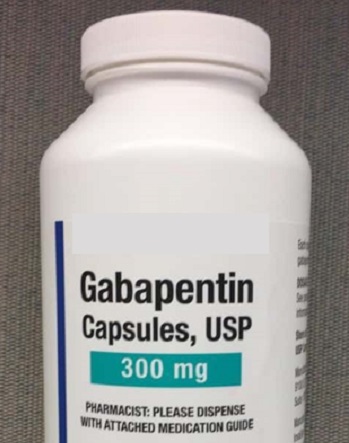Drug Facts for Africans: Gabapentin
By: Ruth Frank, B. Pharm. Freelance Health Writer. Reviewed by Chinedu Akpa, B. Pharm.

Close up photo of a labeled container of gabapentin capsules
As many people may have difficulties pronouncing drug names, let’s start with this simple, yet relevant information; gabapentin is pronounced “gab-a-pen-tin.” In this article, you’ll learn about the dos and don’ts of the drug called gabapentin.
Gabapentin is in a class of medicines called anticonvulsants (i.e. drugs that control convulsion).
You’ve probably heard of convulsion and have an idea about what it is. Convulsions happen when the brain sends out abnormal signals that cause the body to shake uncontrollably without the awareness of the person in question.
Gabapentin comes in various forms: a tablet, a capsule and a liquid solution. Available dosage strength varies with the form.
Some available brands of gabapentin in Africa include Neurontin and Ablept-300. [1]
Gabapentin is used in the treatment of: [1]
It is also used off label (using a medication for conditions or in dosages that it wasn't specifically approved for) in the treatment of several other conditions including,
Gabapentin works by indirectly blocking the release of the chemicals that cause overstimulation of brain cells, hence allowing the brain to function normally. [2]
How is gabapentin taken?
Take gabapentin exactly as prescribed. Do not alter your prescription by taking more or less than recommended. Maintain a schedule for taking your medicine. The dose for gabapentin varies based on the condition it is used to treat.
The initial dose is 300mg every 8 hours by mouth. It can be increased to 600mg every 8 hours.
Day 1: 300mg by mouth once a day
Day 2: 300mg by mouth every 12 hours
Day 3: 300mg by mouth every 8 hours
On day one, 100 to 300mg by mouth 2 hours before bed is recommended. The dose can be gradually increased (within the range of 300-1800 mg/day) every 2 weeks until there's an improvement. [3]
If you miss a dose of gabapentin while on the medication, take it immediately you remember. However, if you remember close to the time you should take your next dose for the day, skip the missed dose. Do not take double the dose to make up for a missed dose.
While on gabapentin, you may experience the following:
Common side effects of gabapentin include:
Gabapentin can also cause serious effects like:
Gabapentin is not considered inherently addictive. Although, in people who have a history of substance use, it has a tendency to cause an addiction. In others, the chances of addiction are rare. [4]
Gabapentin may not be recommended for you if:
Do not take gabapentin together with:
Gabapentin is a prescription medication, specifically an anticonvulsant used for conditions such as epilepsy, restless leg syndrome and nerve pain due to various causes. If you feel your symptoms may require using gabapentin, discuss with your healthcare provider.
Can I take gabapentin with alcohol?
No, you can’t. Alcohol depresses the central nervous system just as gabapentin does. What this means is, the drunken state worsens when you combine both substances, which can be fatal.
Can I stop taking gabapentin when I feel better?
No, you can’t. Gabapentin isn’t a drug to start or stop as you like. Your prescriber must be informed if you have to stop using the medication at any point in time.
Should I take gabapentin with or without food?
Depending on the brand and how long the drug was designed to stay in your body, gabapentin can be taken with or without food. Ask your healthcare provider for more details based on your prescription.
Can I get gabapentin over the counter?
No. To have access to gabapentin, it must be prescribed by your healthcare provider.
Can I drive while taking gabapentin?
Gabapentin can make you feel drowsy. Driving or operating any machine that requires your alertness isn’t recommended while taking gabapentin.
Resources
1. HealthDay (Drugs.com). Gabapentin. [Internet, n.d.] Drugs.com. Accessed July 16, 2025. Available from here.
2. Yasaei R, Katta S, Patel P, et al. Gabapentin. [Updated 2024 Feb 21]. In: StatPearls [Internet]. Treasure Island (FL): StatPearls Publishing; 2025 Jan-. [Accessed July 16, 2024]. Available from here.
3. Medscape. Neurontin, Gralise (gabapentin) dosing, indications, interactions, adverse effects and more. Accessed July 19, 2025. Available from here.
4. Bonnet U, Scherbaum N. How addictive are gabapentin and pregabalin? A systematic review. Eur Neuropsychopharmacol. 2017 Dec;27(12):1185-1215. doi: 10.1016/j.euroneuro.2017.08.430. Epub 2017 Oct 5. Abstract available from here.
5. NHS. UK. Who can and cannot take gabapentin. [Internet]. Last reviewed 2022 Jan. 18. [Accessed July 16, 2025]. Available from here.
6. Drug disposal: FDA's flush list for certain medicines, U.S Food and Drug Administration. [Accessed July 17, 2025] Available from here.
Published: July 23, 2025
© 2025. Datelinehealth Africa Inc. All rights reserved.
Permission is given to copy, use and share content for non-commercial purposes without alteration or modification and subject to source attribution.
DATELINEHEALTH AFRICA INC., is a digital publisher for informational and educational purposes and does not offer personal medical care and advice. If you have a medical problem needing routine or emergency attention, call your doctor or local emergency services immediately, or visit the nearest emergency room or the nearest hospital. You should consult your professional healthcare provider before starting any nutrition, diet, exercise, fitness, medical or wellness program mentioned or referenced in the DatelinehealthAfrica website. Click here for more disclaimer notice.